 资源简介
资源简介
七年级下册第二单元
1.设计依据
人教版七年级下册第二单元的主题是属于“人与自我”范畴,涉及“生活作息”,单元主题是围绕着学生一天的作息活动,跟时间有机结合起来,用一般现在时进行语言交际。
2.教学目标
1.能够理解表示时间的两种方法,并能自如地转换;
2.能够使用一般现在时表达现阶段经常性发生的活动;
3.能够看到第三人称单词就联想到动词的单三形式;
4.能够珍惜时间,养成守时的好习惯;做事不拖拉。
3.学情分析
目前班上的学生个体差异较大,两级分化现象严重,知识能力分布不均衡,很多孩子对英语课堂学习有兴趣,但是落实到口头及笔头比较困难,优秀的学生少,学习思维匮乏,很多学生还没有养成良好的学习习惯。
姓名 联系电话
设计内容 人教版七下 Unit 2 What time do you go to school Section B 1a-----1e
设计主题 课后作业
作业目标 1.巩固日常作息活动的相关词汇; 2.强化时间的两种表示法,树立时间观念; 3.培养语篇意识,能用本单元的核心句型顺畅地表达; 4.对比中外对时间的理解,增强文化认同意识,传承优秀文化。 学会珍惜时间,并逐步养成良好的作息习惯和守时习惯。
作业题量 共5题,其中基础性练习(一,二题),拓展性练习(三,四,五题)
时长 基础性练习(6分钟),拓展性练习(6分钟)
基础性练习(6分钟)
题号 作业内容 设计意图
1 一.看图用两种方法表达下列时刻。(3分钟) (A) (B) ______ / _______ ______ / _______ (C) (D) ______ / _______ ______ / _______ 设计意图: 1.本单元主题是人与自我中的生活作息子主题,通过看图训练来检测学生用数字表达时间的两种方法及数字单词的拼写。 2.能理解past 和to 的不同含义,past 表示“过”,to表示“差”。 3.知道在逆读的时候用a quarter来代替15分钟,用half 表示30分钟。 4.知道使用逆读法的时候,当分钟小于或是等于30分钟时,用past来连接分钟和小时;当分钟大于30分钟,分用60减,小时加上1,用to来连接表示距离下一整点还差多少分钟。
2 二.汉译英。(3分钟) 1. ----你通常何时做家庭作业 ----大约七点整。 ——____ ____ ____ you usually ___ your homework ——____ about seven ____. 2. ----Tony 经常什么时候打扫教室? ----每周三。 ——____ ____Tony often ___ the classroom ——Every _____. 3.你姐姐每天6点45分步行到校吗? ____ your sister _____ to school ____ a ____ ____ seven every day 4.Scott 通常在上午九点一刻做运动。 Scott usually ___ ___ at nine _____ in the morning. 5.她想在晚餐后散散步。 She wants to ___ a ____ after dinner. 设计意图: 1.通过对语句的翻译,培养学生的英语语感,检测学生对本单元核心句型的掌握情况。 2.培养学生仔细看题,根据空格数量选词填空的能力。 3. 检测学生对单数第三人称及其动词的单三形式的掌握情况。反复训练学生对单数第三人称的理解和提高。
拓展性练习(6分钟)
3 三.阅读短文,根据所给的首字母或是单词的适当形式完成短文。(4分钟) Jerry's father works in a music club, He is a m_____. He is very busy, _____ he doesn't have much time with his family. He teaches kids _____ (play) the guitar. He works very long hours every day. Sometimes he works _____ 10 hours a day. Every morning, Jerry's father gets ____ at six. Then he brushes his ______ and washes his face. Then he _____ (eat)his breakfast at about seven and he goes to work at half _____seven. He works all day and ____ (get) home at about eight in _____ evening. On weekends, Jerry's father doesn't go to work. He can stay with his family. Jerry likes _____ (play) the guitar, ______. Sometimes, Jerry and his father play computer games together. They have a lot of ______ (funny) on weekends. 设计意图: 通过语篇填空,帮助学生复习所学,培养学生梳理和推理的能力,锻炼学生的理解和归纳能力,逐步掌握本单元的写作思路和技巧。
4 四.请大家读一读下面的时间,给他们配对。(1分钟) 1) 1. two past two 2. two to two A .one fifty-eight B. two two 1.= _____ 2.=______ 2)翻译短语 “ from two to two to two two” 中文意思是“从____到_____” 设计意图: 通过配对找相同,让学生思考并寻找规律。从六个/tu:/中的翻译之中,找到英语发音的乐趣及幽默之所在。
5 五. 阅读下面有关珍惜时间的格言,选出自己最喜欢的一条并默写下来。(1分钟) Time flies. 光阴似箭,日月如梭。 Time is money. 时间就是金钱;一寸光阴一寸金。 Time works wonders.时间能创造奇迹。 An hour in the morning is worth two in the evening. 一日之计在于晨。 __________________________________________ 设计意图: 通过阅读珍惜时间的格言,对比中外文化的差异,体会语言之美,传承优秀文化,学会珍惜时间,相信时间的力量。培养学生惜时守时的好习惯。
人教版下册7年级第二单元Section B2a-2b
姓名: 联系电话: 工作单位:
作业功能 课前预习 课中练习R课后复习
作业题量 共3题,基础性练习1题,拓展性练习2题
作业时长 基础性练习(6分钟) 拓展性练习1(6分钟) 拓展性练习2(选做)
基础性练习(6分钟)
题号 作业内容 设计意图及题目来源
1 阅读下列短文,然后从后面各小题所给的A、B、C、D四个选项中选出最佳选项。 What advantage does brushing teeth have A.It can keep the body strong. It helps sleep well. C. It can reduce germs in the mouth. D.It helps have a good voice. 2. What’s the proper time for teenagers to drink milk . A.Before going to bed. B. During breakfast. C. After getting up. D. After meals. 3.What is the earliest time for teenagers to get up in the morning A. At 5:00. B. At 6:00. C. At 7:00. D. At 8:00 4.What are helpful to keep the body strong A. Drinking milk and eating fruits. B. Going to bed and brushing teeth C. Eating fruits and brushing teeth. D.Drinking milk and going to bed. 5.Where can we probably read the passage A. Ina story book. B. In a novel. C. In a dictionary. D. In a magazine. 设计意图: 通过对阅读文本中的信息进行归纳与分类,学生可以了解不同国家地区、不同职业、不同人的一日安排,分析并判断其区别。 学科素养: R语言的建构和运用 思维的发展和提升 审美的鉴赏和传承 文化的理解和传承 题目来源:2022四川广元中考真题
拓展性练习(6分钟)
1(必做) 现要求各位同学以小组为单位,在小组内展开调查,用本单元目标语言描述你自己和其他同学一天的学习和生活安排,同时评选出自己认为健康的生活方式(给出理由)和不健康的生活方式(给出合理的建议) healthy生活方式原因Unhealthy生活方式合理建议
设计意图: 1、通过小组调查,促进合作学习,提高合作与探究学习的能力。 2、通过对不同的生活方式进行选择评价,培养学生的思辨能力。还能够促使学生运用本单元的目标语言,用不同的形式进行描述和呈现出自己的作息习惯和日常活动。 3、以多样化的方式提高学生的语言运用能力,增加英语学习的兴趣。 学科素养: R语言的建构和运用 R思维的发展和提升 审美的鉴赏和传承 文化的理解和传承 题目来源:课本(创编)
2(选做) 自行设计以“健康生活”为主题的宣传手册,倡导同学们选择健康的生活方式,养成健康的生活习惯。(选做) 设计意图: 1、通过写作帮助学生输出目标语言,在情境中运用英语进行交流,并用所学习的英语语言知识自信地展示和表达。 2、通过制作宣传册提高学生英语学习参与的积极性与兴趣,从而在真实情境中帮助学生输出目标语言,提高英语的书面表达能力。 学科素养: R语言的建构和运用 R思维的发展和提升 审美的鉴赏和传承 文化的理解和传承 题目来源:课本(创编)
设计依据
单元主题
本单元主要围绕“谈论日常活动和作息时间”这一话题来展开,主要学习生活中日常作息习惯的询问与回答;掌握日常活动的具体表达;学习what time和when引导的询问时间的特殊疑问句以及学习表示动作频度的副词四个方面。
教学目标
1、通过小组调查,学生可以观察、询问他人的生活习惯和行为频率,提高对比分析的能力。
2、通过对阅读文本中的信息进行归纳与分类,学生可以了解不同国家地区、不同职业、不同人的一日安排,分析并判断其区别,提高养成良好生活习惯的意识。
3、通过海报制作,学生可以根据实际情况,描述自己或他人的一日安排。
学情分析
初一年级学生有较强求知欲和表现欲,也具有一定的自主学习和合作探究的能力,但是部分学生在综合语言运用方面还存在不够积极、不够自信问题。
作业目标
1、通过小组调查,学生可以正确运用频度副词,了解他人的生活习惯和行为频率,并且能够合理分析调查数据,正确阐述调查结果。
2、通过阅读文本、比较分析,学生可以发现不同国家地区、不同职业、不同人的一日安排之间的差异,识别不健康的生活习惯,并提出有针对性、切实可行的建议。
3、通过日程表编排、海报制作等活动,学生可以根据实际情况,表述自己或他人的一日安排,实现目标语言的转化输出。
设计思路
1)坚持以学生为中心
本次作业设计选用语篇阅读、小组调查和制作海报等方式呈现,根据实际情况,让学生能够在真实情境中轻松、灵活的完成作业。基础性作业,除个别基础薄薄弱的学生外,其余大多数学生能够在6分钟内完成,拓展性作业,要求学生具备一定的综合运用能力,以此来增强学生自主能力。
围绕主题,递进式设计
在单元主题的引领下,进行递进式作业设计,从语篇阅读、小组调查到海报制作,逐步深入,实现读写衔接。在课本与自身实际相结合的过程中,提高学生自主学习能力、增强学生文化意识,帮助学生综合素质的提升。
采用多样化的形式和内容
通过语篇阅读,锻炼学生理解、归纳能力,深化学生语篇阅读技能训练。通过小组调查,提高学生探究与合作能力,培养学生思辨能力。通过海报制作,提高学生英语学习兴趣,帮助学生输出目标语言,从而提高学生的书面表达能力,
《What time do you go to school Section B(3a-selfcheck)》
作业设计
教材来源:义务教育《英语》教科书/人民教育出版社2012年版
内容来源:初中七年级英语(下)Unit 2 period 5
主 题:谈论日常作息
作业内容:基础性练习作业、提升性练习作业、迁移拓展练习作业
设 计 者:
学 校:
作业功能 课前预习 课中练习 课后巩固
作业题量 基础性练习(必做)共2题,提升性练习(选做1题)共2题,迁移拓展练习(选做)共1题
作业内容及时长 基础性练习(3)分钟,提升性练习(6)分钟,迁移拓展练习(3)分钟
一、基础性练习 (必做) (3分钟)
题号 作业内容 设计意图
1 Fill in the blanks according to the tips. (1).She___(有时) listens to music at night. (2).Liu Xiang runs very ____(很快地) and I want to be a man like him. (3).We call fifteen minutes a ______(一刻钟). (4).The ice-cream _____(尝起来) delicious, but it is not good for our health. (5).He thinks he has a very _______(健康的生活). 意图:通过填空训练,学生可以巩固和拓展他们的英语词汇量,提高词汇掌握能力、语法运用能力,使他们能够更准确地理解和运用常见的英文单词,更好地理解单词的用法,并提高英语的运用能力。
2 Complete the passage according to Chinese prompts. My Day I usually (6).__(起床) at 6:40. I have breakfast (7).__(在) seven o’clock. After breakfast, I (8).__(洗淋浴) and then I (9).__(上学) at 7:20. I get to school at 7:45. I have four classes in the morning. And then I (10).__(吃午饭) at 12:00. In the afternoon, I have four classes,too. I (11).__(回家) at 17:30. I get home at 18:00. I (12).__(吃晚饭) at about 18:30. After dinner, I (13)._(做作业). I (14).__(睡觉) at 19:00. I am very busy and happy every day. 意图:通过语篇填空,帮助学生复习旧知,在语篇中加深对词语的理解和应用。培养学生梳理和概括具体信息的能力,锻炼学生的理解能力和归纳能力,并进一步掌握本单元的写作思路和技巧。
二、提升性练习(自由选择一题做) (6分钟)
题号 作业内容 设计意图
1 Draw a mind map about your daily routine. Then write a passage about your routine. 意图:设计分层作业,给予不同层次的学生多种选择,从基础夯实到实践活动,满足学生多样的活动需求。在练习中提升书面表达能力,并且运用到实际生活中。
2 Interview your father’s or mother’s daily routine. And write a passage about his or her routine.Think about his or her routine and give him or her some advice.
三、迁移拓展作业(选做) (3)分钟
题号 作业内容 设计意图
1 Draw a schedule list on the paper and stick it on your desk. Share with your classmates. 意图:通过制作作息安排表并与其他同学进行分享交流,树立合理安排时间,养成健康生活的意识。
七年级下册Unit 2 模拟测试卷
(考试时间:120分钟, 满分: 120分)
第Ⅰ卷
听力部分
(共三节;满分30 分)
第一节(共5小题;每小题1分,满分5分)
听句子,从下面所给的A、B、C、D、E五个选项中,按顺序选出所听的句子内容相符的图片。听完句子后你将五秒钟做答问题时间。每个句子读两遍。
A.B.C.D.E.
_______ 2._______ 3._______ 4.______ 5._______
第二节(共15小题;每小题1分,满分15分)
听下面六段对话,每段对话后有几个小题,从题中所给的A、B、C三个选项中选出最佳选项。听完每段对话后,你将有10或15秒钟的作答时间。每段对话读两遍。
听第6段对话,回答6、7 小题。
6. When does Zhang Peng usually get up
A. At 5:30. B. At 6:30. C. At 7:30.
7. What does Jim usually do in the morning
A. He does his homework. B. He takes a shower. C. He reads English.
听第7段对话,回答8、9 小题。
8.What time does Jack's mother get up
A. At 5:30. B. At 5:45. C. At 6:15.
9.What does Jack usually do at about 6:40
A. He has breakfast. B. He plays sports. C. He takes a shower.
听第8段对话,回答10、11 小题。
Who works at a radio station
Ben. B.Ben’s uncle. C.Ben’s aunt.
What time is the radio show
From 7:30 to 8:15. B.From 7:30 to 8:50. C.From 7:13 to 8:15.
听第9段对话,回答12、13、14 小题。
12. What does John like doing
A. He likes running. B. He likes drawing. C. He likes singing.
13. What time does Mary usually go to bed
A. At 7:30 am. B. At 5:00 pm. C. At around 10:00 pm.
14. What does Mary usually do in the evening
A. She plays sports. B. She watches TV. C. She reads English.
听第10段对话,回答15、16、17 小题。
15.When does Ann go to school
A. In the morning. B. In the afternoon. C.In the evening.
16. What time does Peter eat breakfast
A. At 6:00. B. At 7:00. C.At 9:00.
17.Who goes to bed at about 9:00
A. Ann. B.Tom. C.Peter.
听第11段对话,回答18、19、20 小题。
18. What time does the girl eat breakfast
A. At 9:00 a.m. B. At 6:00 a.m. C. At 7:00 a.m.
19.When does Tony go to school
A. In the morning. B. In the afternoon. C. In the evening.
20.What does Tony NOT do before 9 o'clock
A. Do his homework. B. Watch TV. C. Go to bed.
第三节(共5小题;每小题2分,满分10分)
听下面一篇短文,根据你所听到的短文内容,选择能回答所提问题的最佳答案,听完短文。后你将有25秒钟的作答时间。短文读两遍。
听短文,回答21-25小题。
21.When does Mary have breakfast
A.At 7:00. B.At 7:15. C.At 7:30.
22.What is Mary's favorite subject
A.Chinese. B.Math. C.Science.
23.What club does Mary join
A.The music club. B.The dancing club. C.The chess club.
24.Who does Mary take a walk with after dinner
A.Her parents. B.Her brother. C.Her grandmother.
25.What does Mary do before going to bed
A.She does her homework. B.She takes a shower. C.She plays the violin.
笔试部分
二、选择填空(共10小题;每小题1分,满分10分)
_______do you have dinner — At seven o'clock pm.
A. What time B. How old C. How much D. Where
27.You’d better do morning ________ every day. It’s good to have lots of ________.
A. exercise; exercise B. exercises; exercise
C. exercise; exercises D. exercises; exercises
28. Bob is never late for work. He _______ comes to work early.
A. sometimes B. usually C. often D.always
29. For students,it’s important(重要的) to know they have to go to school ________.
A. on time B. in time C. at times D. some time
30.—I get up at two in the afternoon and then have breakfast!
—Really That’s a ________ time for breakfast!
A. long B. busy C. funny D. right
31. Different people have different ________ on clothes.
A. love B. interests C. smell D. tastes
32. —It's a quarter ______two. Half an hour later we'll go swimming.
—You mean we'll go swimming at a quarter______three
A.past;to B. past;past C.to;to D.to;past
33. Sally has a busy ______, so she has much _______to do every day.
A. work; work B. job; work C. job; job D. work; job
34. ________ you ________ he cleans our room.
A. Both; and B. Either; or C. Either; nor D. Neither;or
35. —We must ________ the seat belt (安全带) when we are driving.
—That’s right. Safety first.
A. dress B. wear C. put on D. get on
三、完型填空(共15小题;每小题1分,满分15分)
阅读下面的短文从每小题所给的A、B、C、D四个选项中。选出可以填入空白处的最佳选项,使短文意思完整。
Ye Fuyuan comes from Sichuan, China. He lives with 36 father in a small room and Ye Fuyuan's father is disabled(残疾的)and can't 37 .
Every morning, Ye Fuyuan 38 at twenty-five past six and makes breakfast.Then he 39 his father get dressed and eat breakfast. After that, he has his breakfast 40 . At seven o'clock, he 41 to school.At twelve,he runs back home from school, too. Then he 42 lunch for his father,Sometimes he likes to 43 a walk with his father. From nine twenty 44 eleven o'clock at night,he washes clothes or 45 their home. He only has 46 to do his homework 47 eleven o'clock.
Life is 48 for the boy, But he studies hard and is 49 the best student in his grade. He wants to have a trip to London with his father 50 day.
36.A.my B. your C. his D. her
A.play B. work C. eat D. drink
A.gets up B. plays sports C. takes a shower D. goes to school
39. A. asks B. helps C. tells D. wants
40. A. early B. late C. slowly D. quickly
41 . A.walks B. runs C. plays D. dances
A.eats B. sees C.makes D.finds
A.get B. come C.go D. take
A.to B. in C. at D. on
A. loves B. thanks C..cleans D. draws
A.money B. thing C. time D. club
A. before B. after C. over D. past
A. difficult B. relaxing C. boring D. interesting
A. only B. never C.sometimes D. always
A.some B. no C.much D. any
四、阅读理解(共15小题;满分30分)
第一节 阅读下面三篇短文,根据短文内容从每小题所给的A、B、C、D四个选项中选出最佳选项。
A
Do you have healthy habits
Jenny White Yes. My habits are very good. I never eat unhealthy food. Ice-cream tastes good but I never eat it. It's unhealthy. Every day I get up at six o'clock and go to bed at eight thirty. I eat well and play sports every day. I run with my father for half an hour in the morning. So I'm very healthy.
Alan Smiths Yeah! I think my habits are very healthy. Every day I get up early and go to bed early. Every morning I eat breakfast and eat well. I eat fruit and vegetables every day.And every day I play soccer for two hours with my friends.
Lily Brown No,I don't.I get up late so I have no time to eat breakfast.I always take bread and milk to school. For lunch, I usually eat lots of hamburgers. I know they are not good for me but I like them. I never play sports. In the evening, after I finish my homework, I usually play computer games. I go to bed late, at a quarter past eleven .
51. Why doesn't Jenny eat ice-cream
A. Because she doesn't like it. B. Because it’s not healthy.
C. Because it doesn't taste good. D. Because her parents don't let her eat it.
52. What does Alan do with her friends every day
A. He goes to school. B. He does her homework.
C. He plays soccer. D. He has lunch.
53.What time does Lily go to bed
A.About 8:00. B.About9:00.
C. About10:00. D.About11:00.
54. Which statement is NOT true according the passage
A. Ice-cream tastes good but Jenny never eats it.
B. Alan eats well and he eats fruit and vegetables every day.
C. Lily has no time to eat breakfast so she always take hamburgers to school.
D. Jenny runs with her father and Alan plays soccer for two hours with friends.
55. What do you know from the passage
A. Helen doesn't like playing sports.
B.Alan plays sports every day.
C. Mary and Helen have healthy habits.
D. Alan doesn't do his homework in the evening.
B
Jack is 15 years old. He wants to take his family , his parents and his sister Jessica out to lunch, so he wants to make money(挣钱) by helping his parents do some things.
Jack gets up at 6:30, and then he cleans the house. At about 7 :00,he eats breakfast and then goes to school. He has four classes in the morning and three in the afternoon. At 5:30 Jack gets home and he helps his mom buy food, or cleans the car for his father. Sometimes,his sister helps him. Jack has 95 dollars now. He still(仍然) needs 55 dollars. He is very happy when he takes his family out to lunch, he will pay the bill.
56. How many people are there in Jack's family
A.Three. B.Four. C.Five. D.Six.
57. How does Jack make money
A. By working in a shop. B. By selling some things.
C. By writing books. D. By doing some things for his parents.
58. What does Jack do before he goes to school
A. He buys food. B. He buys books.
C. He cleans the house. D. He cleans the car.
59. Jack needs _______dollars in all( 总计). .
A.55 B.75 C.100 D.150
60. What does the underlined phrase “pay the bill”means in Chinese
A.存钱 B.付账 C.做饭 D.度假
第二节 阅读下面短文,根据短文内容,从方框内所给的选项中选出能填入空
白处的最佳选项,使短文完整,意思通顺。
My name is Lucy. 61 .I have breakfast with my parents and my sister Paula at home. I like hamburgers but my sister likes milk and eggs. 62 .
Paula and I have lunch at school. In the afternoon,I go to science class and then play basketball. 63 . After school we go home and do our homework first. After dinner, we help our mother. 64 . Then we read books and talk about our day. My sister and I go to bed at nine o'clock.
On weekends Paula and I get up late,at about nine o'clock. We play games in the park or in our garden. Then we visit our grandmother. 65 . She makes fruit salad for us and we play there all afternoon. It's great fun!
A. My parents always eat bread.
B. We like her very much.
C. I always go to bed late.
D.I clean the rooms and Paula does the dishes(清洗餐具).
E. Paula goes to art class and then plays the violin.
F.I usually get up at half past seven.
第Ⅱ卷
五、阅读下面短文,用所给词的适当形式填空(共10小题,每小题1分,满分10分)
My grandmother is eighty-five years old.She is a great 66 (music).She often 67 (teach) me to play the violin.She has some 68 (well) habits.She always gets up early, about five thirty.Then she get 69 (dress) and brushes her teeth. After that, she does morning exercises for half an hour . She likes taking 70 walk in the park.She can eat apples 71 (quick). Because she has good 72 (tooth).But her ears (耳朵) are not good.She always asks “what" when I talk 73 her.Her eyes are not good, 7 4 .She calls me“Helen”when she sees me. Helen is my 75 (sister) name.
I love my grandmother very much .I am her ears and eyes from now on.I hope my grandmother can live a happy life.
六、完成句子。(共5小题10空,每空1分,满分10 分)
76. 我哥哥在电台工作。
My brother works at a _____ _______.
他通常晚上八点半起床。
He ______ _______ _______ at eight thirty in the evening.
早餐后,他总是会锻炼一小时。
After breakfast, he always _______ ________ ________ _________.
他十一点去上班,从来不会迟到。
He goes to work at 11:00 pm., _______ ________ ______ _______ ______.
他的节目是从午夜十二点到凌晨五点。
His radio show is _____ _______ ______ _________ _______ ______ in the morning.
七、书面表达 (共1题,满分15分)
81.假如你是李文,你们学校要举行以“优秀不是一种行为,而是一个习惯”为主题的英语演讲比赛。请你根据以下提示用英语写一篇演讲稿,与同学们分享你的好习惯。
提示:
1. Do you get up and go to bed early
2. Do you often play sports
3. Do you often read
4. Do you eat fruit and vegetables
要求: 70词左右,可适当发挥。开头和结尾己给出,不计入总词数。
Hello, everyone!
I do believe that excellence is not a behavior but a habit. Now let me tell you about my
good habits.
That's all. Thank you!
展开更多......
收起↑
 资源预览
资源预览
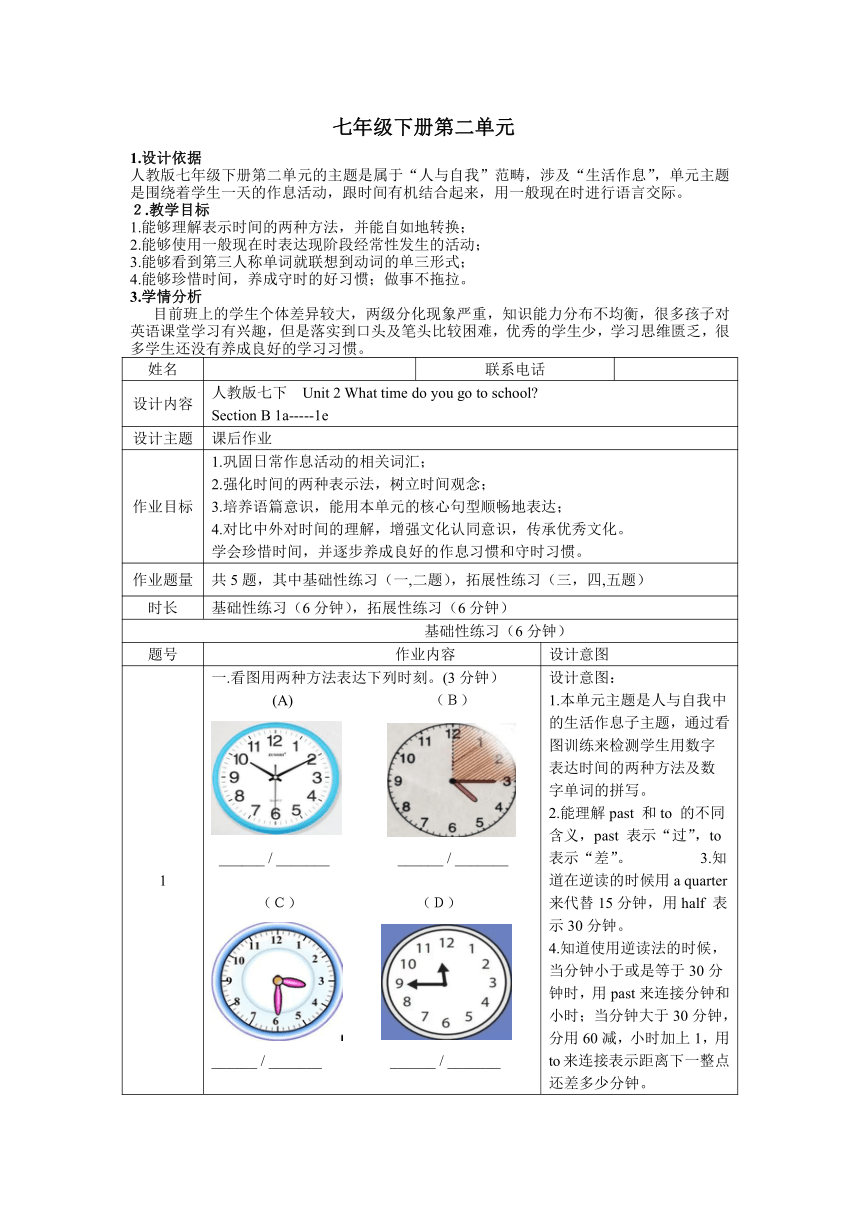
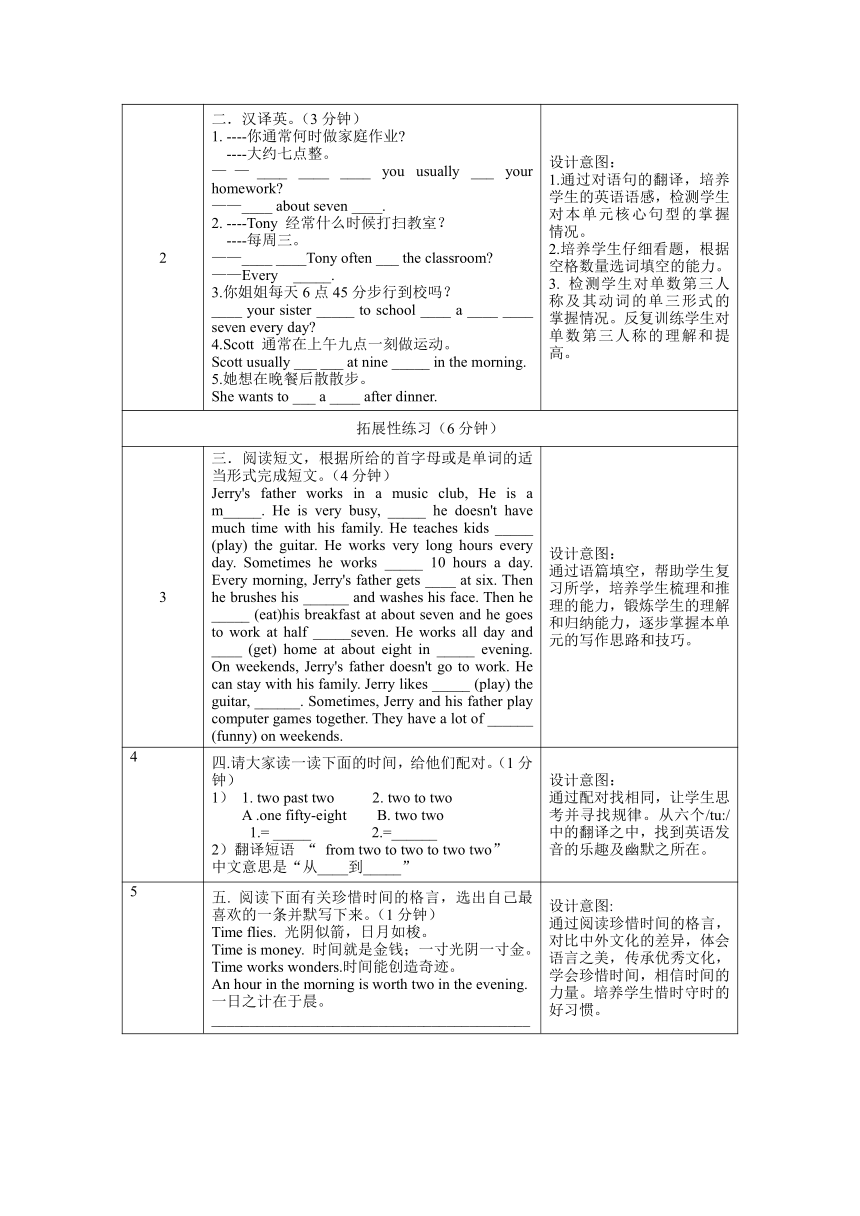
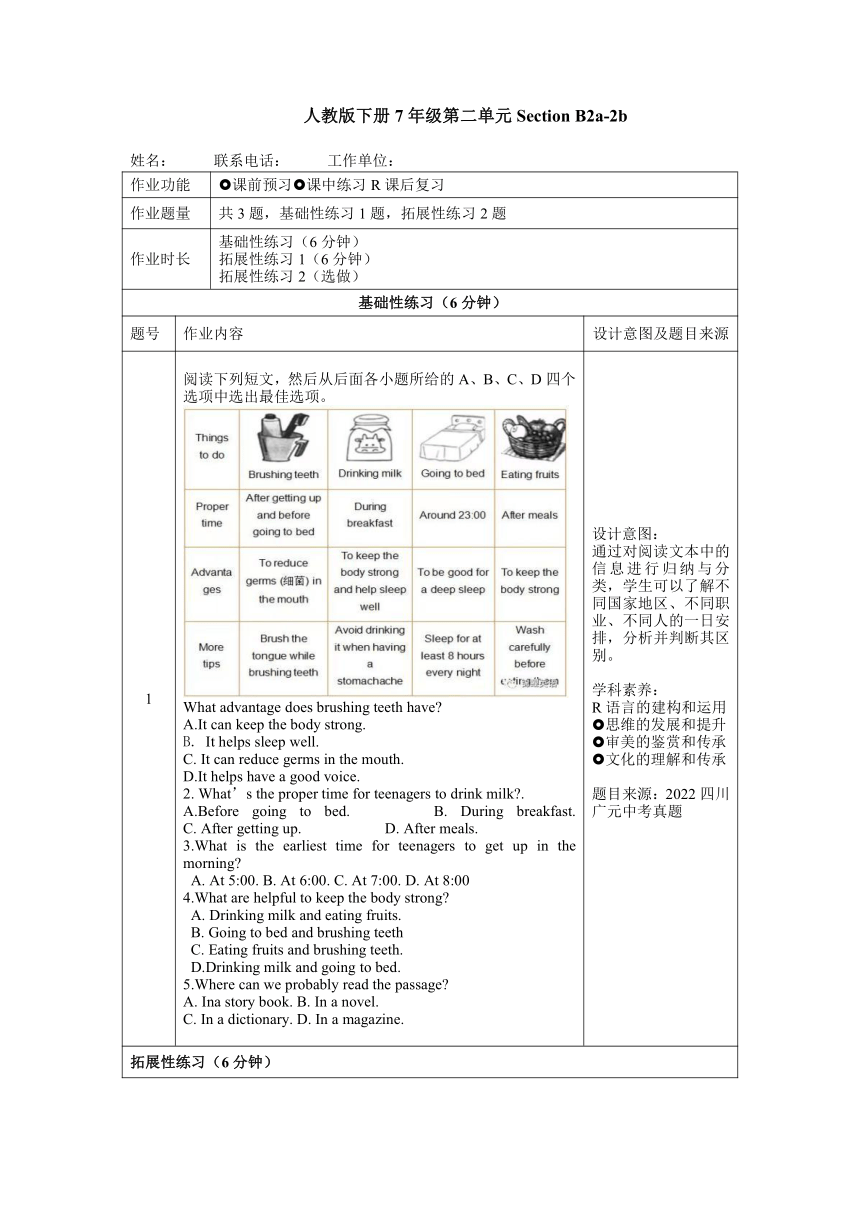
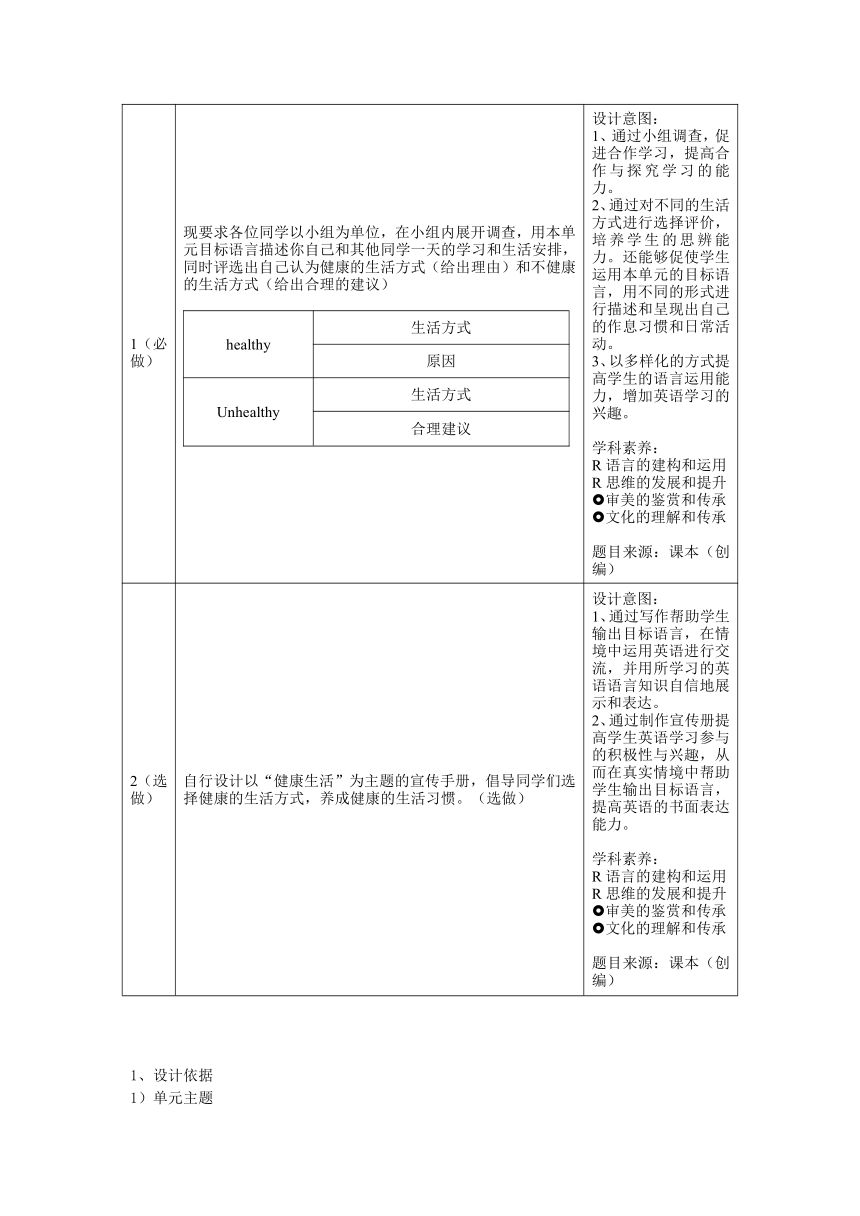
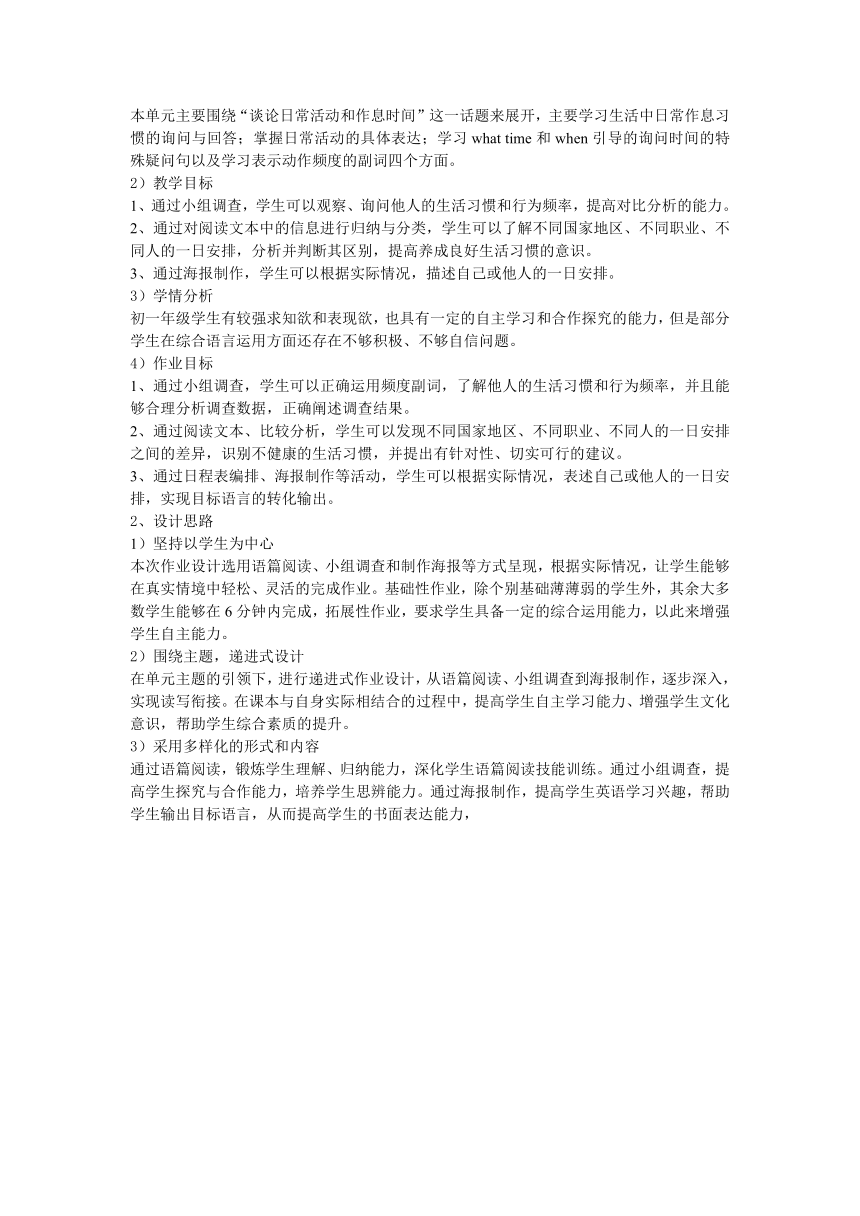
 资源预览
资源预览




